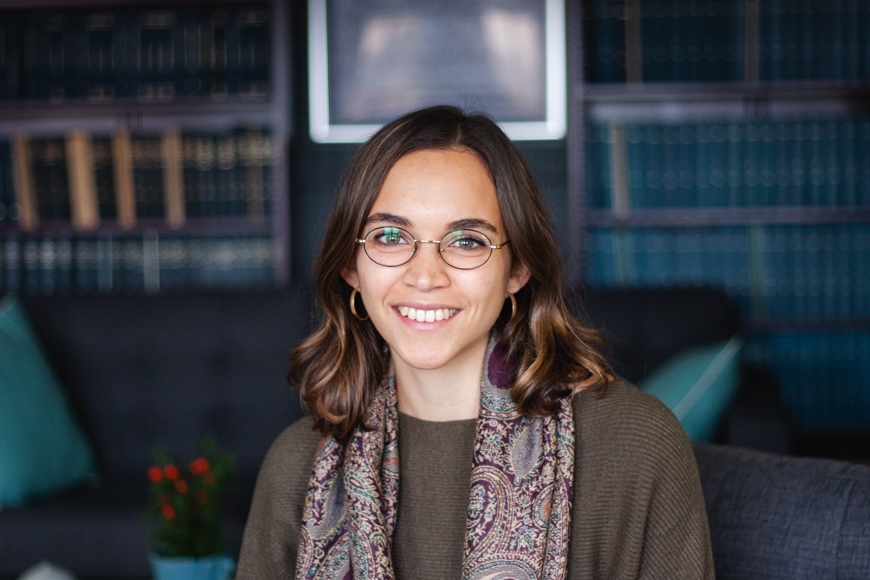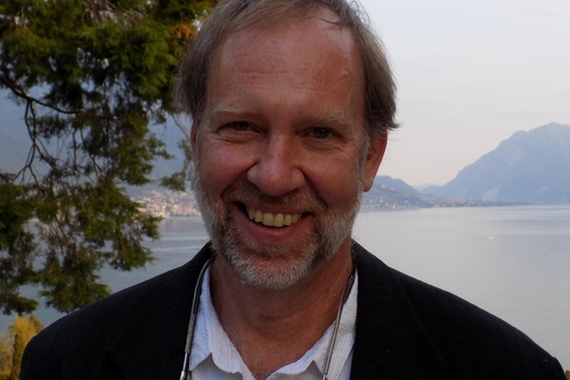Meet Tamara Fakhoury: Philosopher, Artist, Educator
This semester, UMN’s Department of Philosophy welcomed Assistant Professor Tamara Fakhoury from University of North Carolina at Chapel Hill. Fakhoury, an artist, educator, and philosopher originally hailing from Beirut, studies quiet resistance, a form of resistance where individuals pursue values and aspirations that are forbidden by oppression. Fakhoury shares about her background, her focus in philosophy, and how she has already made her place at the University.
Where are you from and where did you go to school?
I am originally from Beirut, Lebanon. My parents immigrated to the United States during the Lebanese Civil War. I was born in San Diego, California, and until I was 16, I grew up in Bellevue, Washington. In 2007, we moved back to Beirut to be closer to family. My parents also wanted my sister and me to reconnect with our culture and experience the world from a different point of view.
Life in Beirut was amazing for my creativity. (Check out my painting “Fauves,” published in Rusted Radishes: Beirut Literary and Art Journal.) I also developed a deep admiration for the ancient world. I spent weekends driving all over the country searching for ancient ruins and adventuring with my dad.
With the encouragement of my professors at the American University of Beirut, I applied to graduate school in philosophy and was extremely fortunate to end up at the University of North Carolina at Chapel Hill, where I received my PhD in May 2019.
How are you settling in at the University of Minnesota?
One of my favorite things about UMN so far is the intellectual community. The philosophy department here encourages students to become well-rounded and practically minded philosophers and provides them with abundant opportunities to develop interdisciplinary interests. There is a lot of support for underexplored topics and different styles of doing philosophy.
We also care a lot about each other’s research interests. Every week, graduate students and faculty get together to workshop each other’s papers and share pedagogical and professional advice. A couple of my colleagues are even sitting in on my graduate seminar. The graduate students are very conscientious and fun to talk philosophy with. I appreciate their willingness to self-reflect and bring philosophy to bear on difficult questions they encounter in their daily lives.
UMN undergraduates are extremely perceptive and I enjoy their eagerness to draw connections between our philosophical discussions and what they’ve learned in other courses, like science and history. The philosophy department also has a longstanding commitment to inclusivity in philosophy and several of my colleagues are working to diversify the canon.
What led you to study philosophy?
I was introduced to philosophy in high school in Beirut, while completing the International Baccalaureate (IB) program. I had an amazing history teacher who had us read Plato, Marx, and Nietzsche and taught us all about European colonialism, which has influenced my thought a great deal. Though I actually went to college wanting to major in archaeology, I soon realized that my real interest was in studying value systems and their historical development.
Aside from my wonderful teachers, I think what initially drew me to philosophy was an appreciation for the questions: Is morality simply a convention devised to serve the interests of the powerful? What makes an action good? Do human beings possess free will? How do I know that what I see is real? Questions like these challenged the foundations of everything I took myself to know. Thinking through them was exhilarating. It expanded my conception of what is possible and freed me from the dogmatism that entrapped so many people around me. Most importantly, philosophy was fun and my philosophy professors were very smart and fun to spend time with.
Your dissertation focused on quiet resistance. How do you define that?
To quietly resist is to engage in something—a personal project, preference, relationship, commitment or ideal—that is forbidden by oppressive social conventions, without serving as a means to activism or public protest. Quiet resistors know that there are social forces forbidding them from doing what they want to do, including various oppression-related harms. However, they are motivated to discount or dismiss these potential risks and act because of or, at the very least, in spite of them. Their resistance is “quiet” not because it literally cannot be heard, but because it does not attempt to communicate a public message of resistance with the aim of achieving political or humanitarian goals. Refusing to be stopped from doing what they care about, quiet resistors do it anyway, insisting on pursuing their values oppression notwithstanding.
I argue that quiet resistance is valuable independently of any positive political consequences. When it exhibits an attitude that says “I will not be stopped from doing what I want to do,” it can exemplify a kind of self-respect. And, when it involves pursuing something that is both subjectively fulfilling and objectively valuable, it can be a source of meaning in life under oppressive conditions.
What are some examples of quiet resistance?
First, I think many Muslim women who choose to wear the hijab in contemporary America are engaging in quiet resistance. Many choose to wear it out of love for their religion and culture, not out of political protest. There are obvious oppression-related harms they make themselves vulnerable to by wearing it. In addition to receiving inappropriate comments from well-meaning yet often ignorant people, they become easily identifiable as a Muslim, which makes them easy targets for discrimination, harassment and hate crimes. These women courageously wear the hijab anyway, in spite of countervailing social pressures.
Second, Lebanese rock band Mashrou’ Leila—whose music challenges social conventions and has a strong fan base among feminist and LGBTQ Arab youth and the diaspora—quietly resist by continuing to create and perform their music in spite of hostility against them. Though they regularly tour in the Arab world, Europe, and the United States, they are banned from performing in Egypt and Jordan. In August 2019, they were forced to cancel their third appearance at the Annual Byblos International Festival due to threats of violence from Lebanon’s extreme Christian Right. In interviews, the band says they are just trying to do their own thing and that it is their love of music, not any political cause, that keeps them going.
Third, before she was appointed a Supreme Court Justice, Ruth Bader Ginsburg quietly resisted gender oppression through her academic and professional success. As a graduate student, she was chastised for taking a man’s spot at Harvard Law, shut out of job opportunities because she was a woman, in addition to suffering other forms of misogynist hostility for daring to be a female lawyer in a man’s world. Nevertheless, she withstood sexist pressures to give up on her career because of her deep love for the law.
How did the idea of quiet resistance become your focus?
Though people from all over the world engage in quiet resistance, what originally drew me to this topic was my fascination with the undefeatable spirit of the Lebanese people, and of Arabs in general. I am constantly amazed by their ability to enjoy life, even in the midst of war and political instability. Refusing to be stopped from pursuing what they care about, they aim not merely to survive war, oppression, and political corruption, but to thrive in spite of it. Over the years, I found myself asking: How should we understand their distinctive practices of resistance and their value?
When I turned to the philosophical literature on resistance, I found a lot of writing on paradigmatic cases of civil disobedience and protest, but very few resources that were helpful in explaining the cases that I had in mind, where the people are not acting for political or humanitarian causes, but for reasons having to do with their own personal cares and commitments. Philosophers have tended not to address quiet resistance directly, either leaving it out of their discussions or constructing theories that would disqualify it from counting as genuine resistance. I wanted to fill this gap in the literature by shedding light on these more personal forms of resistance that seemed extremely important for understanding the lives of those who deal with oppression on a regular basis.
What classes did you teach this fall?
I taught a 3000-level course in ancient Greek philosophy and a graduate seminar in feminist philosophy.
For the Greeks, the purpose of philosophy was not merely to arrive at abstract theoretical conclusions, but to help people live better lives. In this course, we focused on Ancient Greek conceptions of happiness and the good life. In light of reading Plato, Aristotle, Epicurus, and Epictetus, we considered questions including: What makes our lives go well? Does it all come down to getting what we want and doing what feels good? Or, might the best things in life come apart from what we happen to enjoy most? Is there any connection between an individual's happiness and their ethical status? Or, would we instead be happier if we could, say, break the rules without ever getting caught? Does happiness require knowledge, or is it instead true that “where ignorance is bliss, 'tis folly to be wise?” Is there an important connection between individual happiness and the good of society at large? If so, how should that influence how we shape our socioeconomic and political systems?
In the feminist philosophy seminar, we focused on understanding misogyny and gender-based oppression. Topics we discussed included psychological oppression, intimidation, gaslighting, silencing, emotional labor, intersectionality, privileged male entitlement, sex and gender, anger, and resistance. In the latter half of the course, we read Kate Manne’s recent book Down Girl: The Logic of Misogyny.
Beyond the classroom, how have you gotten involved in the philosophy community here at UMN?
There are a number of great programs I get to take part in at Minnesota including Ethics Bowl, events put on by Minnesota MAP (Minorities and Philosophy), such as their recent roundtable discussion on disability, and fun departmental outreach events such as our recent “Facts & Fakes: Philosophers on the Search for Truth” event at Surly Brewing Co. I am also a faculty representative on the diversity committee, which works to enhance inclusivity in philosophy. There are a number of initiatives we’re working on putting together this year, including departmental workshops on inclusive pedagogy.
Your website also highlights your artwork. How do you combine your work in philosophy with your passion for art?
I think of philosophy as a kind of art. Like artists, philosophers are engaged in the skillful representation of concepts and ideas. Creativity and a strong imagination are invaluable tools for philosophers and artists alike. Good philosophers, like good artists, have an eye for beauty, emotion, symmetry, contrast, persuasion, and composition. As for actual things I’ve done to incorporate art and philosophy: in spring 2019 I taught a course at UNC Chapel Hill on the philosophy of art and aesthetics. When I was an undergraduate student, I did a series of philosopher portraits. Now that I have very little free time, I enjoy doodling during talks (it helps keep me focused!). I still paint occasionally.
This story was written by an undergraduate student in CLA.



